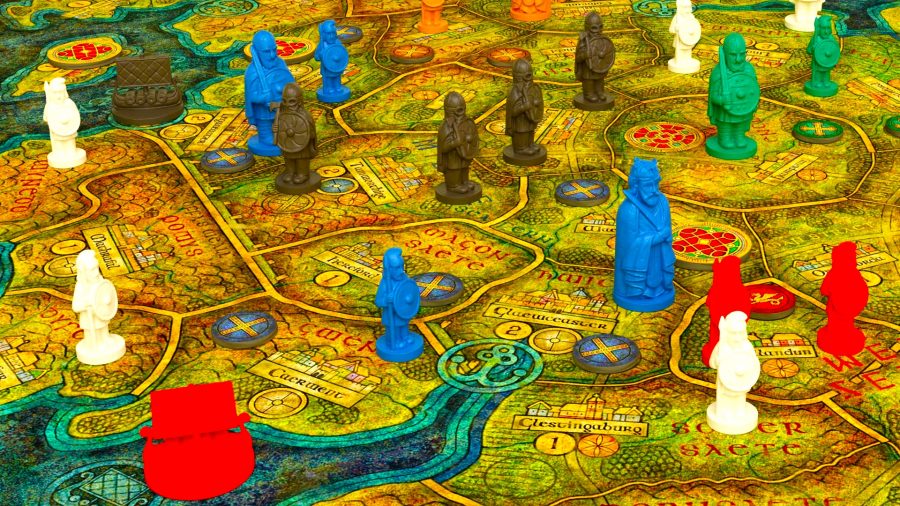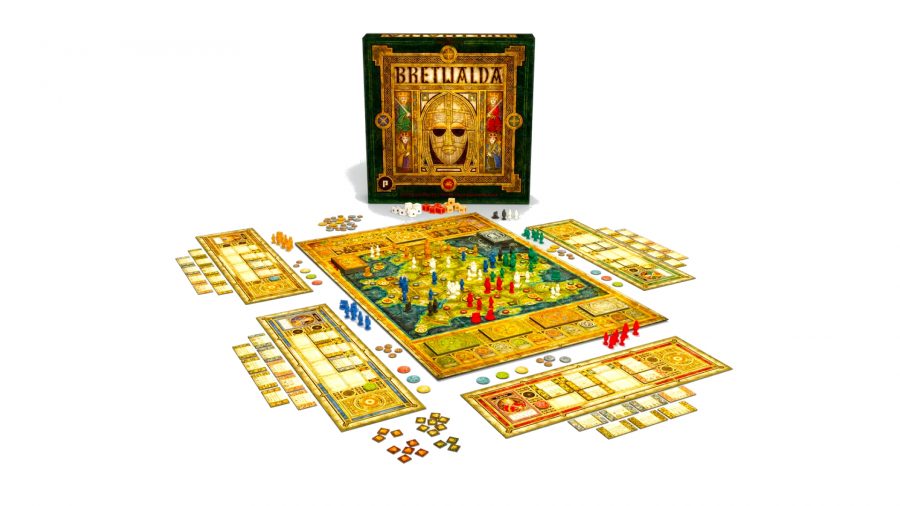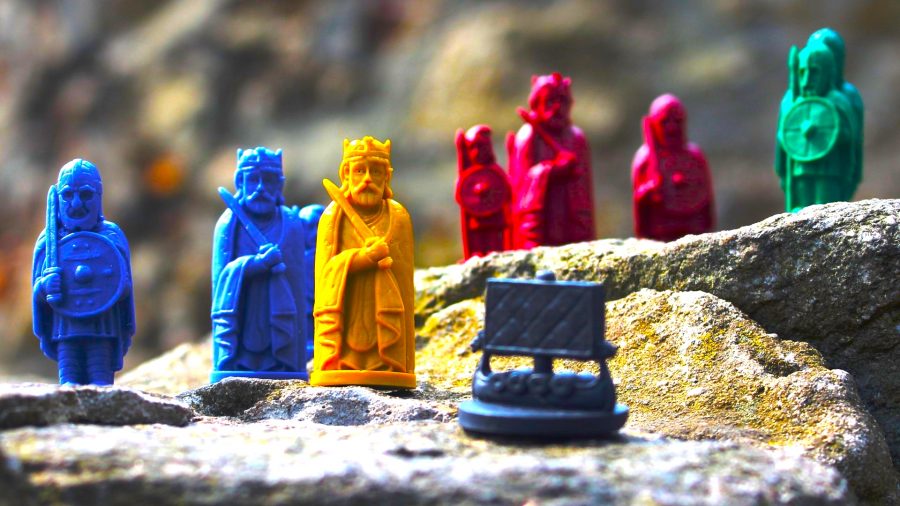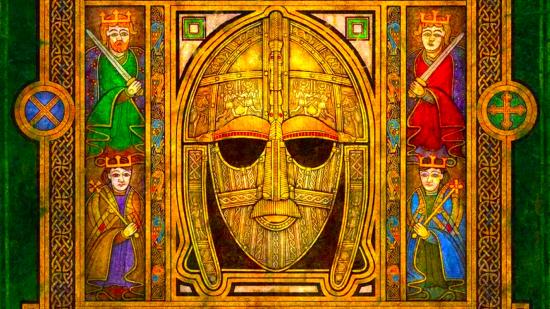Our Verdict
Bretwalda has many unique, interesting, and ultimately fun features - but it's kept from greatness by a lack of precision and balance in places.
Phalanx is a tabletop publisher with a clear love of historical board games. As well as publishing the Polish edition of the beloved strategy board game Brass: Birmingham, it added new entries to the historical genre with games like UBOOT: The Board Game and Purple Haze. Bretwalda, an upcoming Gamefound board game set in 796AD Britain, shows equal amounts of passion for the past.
Bretwalda is a fast-paced area control strategy game for one to four players. Visually it’s inspired by the 12th-century Lewis chessmen, and mechanically it depicts a struggle for ultimate supremacy between four kingdoms. You’ll need to weather changing seasons, conquer new lands, complete Chronicle challenges, and build plenty of abbeys if you want to take the crown. Barter, battle, and betray your fellow rulers – and after 12 rounds, one of you will be crowned the new ‘Bretwalda’.
Bretwalda’s visual design is interesting and effective, as are many of the mechanics it introduces. There’s plenty for a strategic player to chew on, and a 2-hour run time feels incredibly approachable given the varied mechanics on offer. But sadly, like the untamed fields of Anglo-Saxon Britain, Bretwalda often lacks the finesse required of a strategy game that belongs in the history books.
Before we explore the game any further, it’s important to note this review is based on an early copy of Bretwalda. The final copy shipped to Gamefound backers will definitely be tweaked in places. We’ve based our review on the copy we had to play with, but we’re also hopeful Bretwalda will only get better with age.
Top of their game: A guide to the best board games around
In a world of overly brown historical board games, Bretwalda is a breath of fresh air – without straying too far from tradition. The faithful recreation of Anglo-Saxon tapestries and metalwork create a uniquely beautiful box, board, and set of components.

It’s colourful, but in a dulled-down way that reminds you of plant-dyed wool and swords that have tarnished with age. The Lewis chessmen meeples are also delightful. Perhaps the only downside to this design choice is readability – you’ll occasionally need to squint to figure out which sea or ye olde British city you’re in.
You start the game as one of four British monarchs, each with their own capital city, unique ability, and small army. The game’s 12 turns are split into three seasons. Springs can be wet or bountiful, helping you produce resources or hindering your movement on the Roman roads; summers bring invading Vikings that you can bid on to attack your enemies instead of you; autumn is full of bribery as you convince neutral parties to descend upon your rivals; and you must feed your troops in winter or watch their numbers deplete.
It takes two: A guide to 2 player board games
Each season allows you to take two of your four available actions: collect food and money, move troops and battle, recruit and upgrade troops and ships, or develop buildings and ‘kingdom tiles’ with special abilities. You ultimately want to earn the most Dalcs – a period-appropriate broach that represents a victory point. These are earned by claiming certain lands, building enough abbeys, or completing the secret missions on your ‘Chronicles’ cards.
There’s a lot going on in Bretwalda, and this ends up being something of a double-edged sword. It gives you several ways to play, which is essential for attracting different types of players and making them want to come back for more. The variety of gameplay options gave me the thrill of exploration I cherish in strategy games – early game, it felt like the entire British map was my oyster, brimming with victory point potential.

But the relatively short runtime means it’s difficult (or even unrewarding) to fully explore certain elements of the game before the Bretwalda is declared. The ‘Kingdom’ tiles are a good example of this. They cost three gold pieces, and you can only purchase one per round. There’s a Chronicles card in the game that sets you the challenge of buying eight Kingdom tiles – that’s eight turns of generating enough money for a tile and then purchasing it.
War gaming: The best WW1 board games
Your reward for using over 60% of your turns to buy Kingdom tiles? One victory point. In a game where you’re racing to get five, six, or even seven victory points, Chronicles cards like this are an incredibly inefficient option – I found myself constantly exercising my right to swap a Chronicle card for a new random one. They felt achievable perhaps half of the time, and I more often ignored them for faster ways to score.

Other mechanics also don’t feel as well executed as they could be. It’s interesting that each ruler in the game gets a unique ability from their capital city, but it also feels a bit too much like it’s steering you towards one specific strategy at times. Bretwalda encourages bartering, but in a head-to-head two-player game, you’ll rarely want to give your opponent the upper hand. And if you can’t set up a solid engine for generating food, money, and troops early on, your kingdom falls apart early with few options for snatching victory from the jaws of defeat.
It’s not game-breaking that Bretwalda doesn’t feel perfectly optimised for smaller player groups. It’s also not uncommon for games with resource management mechanics to leave the losing player straggling far behind. Bretwalda is still enjoyable – but in places, it does lack elegance.
All grown up: These are the best board games for adults
The most noticeable lack of polish is in the one part of Bretwalda that isn’t finished yet – the rulebook. Complex games require the utmost clarity in wording, and I often found myself making educated guesses on how mechanics work based on the rulebook explanations. However, I’m hopeful future players teaching Bretwalda will have a much tighter experience with the final product.
Bretwalda has a lot of loveable parts, particularly for any fans of this historical period. In a genre of seemingly endless WW2 games wearing different shades of beige and khaki green, it’s a unique and worthy entry – but its mechanics may need some finetuning before it can be considered one of the greats.
